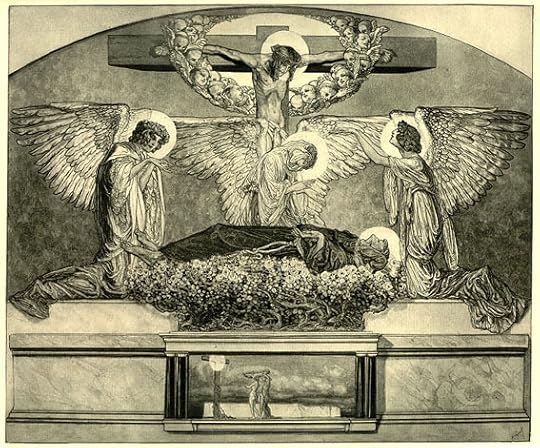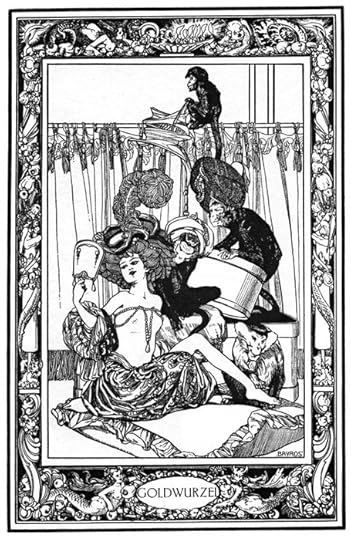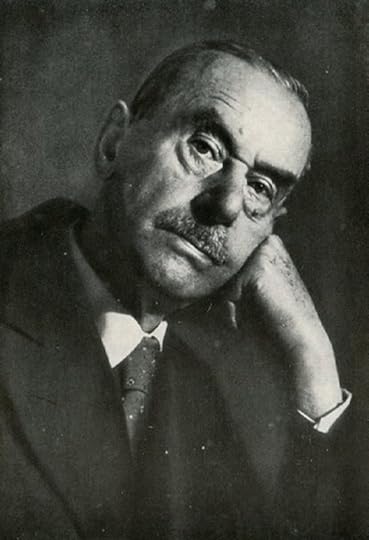What do you think?
Rate this book


706 pages, Paperback
First published November 1, 1924
Love stands opposed to death – it alone, and not reason, is stronger than death. Only love, and not reason, yields kind thoughts.
…our interest in death and illness is nothing but a way of expressing an interest in life…


When he was done, he said, ‘You may leave.’
Hans Castorp stammered, ‘You mean…but how can that be? Am I cured?’
‘Yes, you’re cured […]. As far as I’m concerned, you may leave.’
‘But, Director Behrens. You’re not really serious, are you?’
The night of its pubic region built a mystic triangle with the steaming pungent darkness of the armpits, just as the red epithelial mouth did with the eyes, or the red buds of the breast with the vertically elongated navel.
‘Did you know that the great Plotinus is recorded to have said that he was ashamed to have a body?’ Settembrini asked, and with such earnest expectation of an answer that Hans Castorp found himself forced to admit that this was the first he had heard of it.
‘There are so many different kinds of stupidity, and cleverness is one of the worst. Hello! Why, I think I’ve just coined a phrase, a bon mot. How do you like it?’
They carried everything to extremes, these two...and squabbled fiercely over the most extreme choices, whereas it seemed to him that what one might, in a spirit of conciliation, declare truly human or humane had to lie somewhere in the middle of this intolerant contentiousness, somewhere between rhetorical humanism and illiterate barbarism.
“¡Qué audacia descender a las profundidades, el mundo insignificante y absurdo de los muertos!”Pues sí, señoras y señores, la muerte es el final de la película que protagonizamos todos y cada uno de nosotros, perdonen el spoiler. Y aunque afortunadamente vivimos buena parte de nuestra vida de espaldas a ese desenlace seguro, la muerte nos constituye y nos condiciona como especie y como individuos. Nada más lejos de la verdad esta sentencia de Epicuro que el autor incluye en su novela.
“Mientras existimos nosotros, no existe la muerte, y, cuando existe la muerte, no existimos nosotros; por consiguiente, no hay ninguna relación real entre la muerte y nosotros; la muerte es algo que no nos atañe absolutamente en nada.”“La montaña mágica” nos acerca a la muerte, y no solo por lo que se tarda en su lectura. La muerte está presente a lo largo de toda la novela, aunque su función no sea otra que prepararnos para la vida. Mann nos viene a decir que la auténtica salud solo puede conseguirse tras el enfrentamiento con lo que supone la enfermedad y la muerte. Pero también habita en esta montaña una “magia del desvarío” catalizadora del cambio de naturaleza que se produce en las personas que allí suben y que corren el peligro de conformar una nueva patria que les expulsará de la otra, la sana físicamente, la cruel y vana.
“Hay un estado de buena salud que no nos permite comprenderlo todo” André Guidé.Como si de un cuento se tratara, esos que se cuentan a los niños para ayudarles con sus miedos, Mann nos presenta a Castorp, huérfano de padre y madre, a los que apenas conoció, que, tras sondear “abismos que en otros tiempos se encontraban insondables”, a través de un “camino pedregoso, salvaje y amenazador” llega a un mundo parecido al conocido pero sustancialmente distinto, el sanatorio en el que su primo se recupera de una enfermedad que puede ser mortal. La visita de tres semanas acabará por durar siete años.
"A veces pienso que estar enfermo y morir no son algo tan serio, sino una especie de paseo sin rumbo; en realidad, las cosas serias no se encuentran más que en la vida de allá abajo.”Sabremos de la humillación que supone la enfermedad, de la crueldad de la naturaleza en consentirla, de la soberanía sobre nosotros que el cuerpo adquiere y, por último, lo más importante quizás de la novela, de la enfermedad como anestesia, como obstáculo para la actividad y la lucha, la enfermedad como aristocracia, como equivocada fuente de dignidad. Los enfermos establecerán en la montaña una comunidad de elegidos viviendo en un espacio sin tiempo y a salvo de las otras fiebres que sufren los del mundo de allí abajo.
“Aquellos cuyo destino justificaba la excepcional necesidad de consuelo, aquellos que habían hecho un pacto interior con la naturaleza en el que renunciaban a las alegrías y desgracias de la vida en el mundo de allá abajo a cambio de otra vida, marcada por la apatía y la inercia pero muy, muy fácil y placentera, tan libre de preocupaciones que hasta anulaba el sentido del tiempo.Todo lo dicho hasta ahora justifica el que haya mantenido tres de las cuatro estrellas que los míticos recuerdos de mi primera lectura, allá por el pleistoceno, me animaron a otorgarle en el momento en el que inicié mi andadura por estos mundos goodreadsianos. Aunque también he de decir que una de las tres estrellas que permanece en mi calificación casi se debe en exclusiva al capítulo titulado Nieve, espléndido.
“N: No creo equivocarme al suponer que estamos de acuerdo en admitir un estado original e ideal de la humanidad, un estado sin organización social y sin violencia, un estado de unión directa de la criatura con Dios en el que no existían el poder ni la servidumbre, no existían la ley ni el castigo, ni la injusticia, ni la unión carnal, ni la diferencia de clases, ni el trabajo ni la propiedad; tan sólo la igualdad, la fraternidad y la perfección moral.En fin, otro encuentro algo decepcionante con aquel lector que fui.
S: Estoy de acuerdo excepto en el punto de la unión carnal.”





"But he who knows the body, who knows life, also knows death. Except that's not the whole thing - but merely a beginning, pedagogically speaking. You have to hold it up to the other half, to its opposite. Because our interest in death and illness is nothing but a way of expressing an interest in life..."
"...All the rest is either topical trash or what some call the Literature of Ideas, which very often is topical trash coming in huge blocks of plaster that are carefully transmitted from age to age until somebody comes along with a hammer and takes a good crack at Balzac, at Gorki, at Mann."

Ah yes, irony! Beware of the irony that flourishes here, my good engineer.

"...For even if the state’s ungodliness were not branded on its brow, one need only note a simple historical fact—that its origins can be traced to the will of the people and not, like those of the Church, to divine decree—and thereby prove that the state is, if not exactly a manifestation of evil, then at least a manifestation of dire necessity and sinful shortcomings...”
“…capitalists were strong believers in the Judeo-Christian West. They were either active participants in the Jewish faith, they were active participants in the Christians’ faith, and they took their beliefs, and the underpinnings of their beliefs was manifested in the work they did. And I think that’s incredibly important and something that would really become unmoored
I will tell you that the working men and women of Europe and Asia and the United States and Latin America don’t believe that. They believe they know what’s best for how they will comport their lives. They think they know best about how to raise their families and how to educate their families. So I think you’re seeing a global reaction to centralized government, whether that government is in Beijing or that government is in Washington, DC, or that government is in Brussels. So we are the platform for the voice of that…”
"...the Renaissance gave birth to what is known as liberalism, individualism, humanistic citizenship, and all that...[but]...your ideals came to an end long ago - those ideals are dead, or at best lie twitching in their death throes, and those whom they had hoped to finish off have got their foot in the door again..."
"...It was many, many years and decades of peace. And I believe we’ve come partly off track in the years since the fall of the Soviet Union and we’re starting now in the 21st century, which I believe, strongly, is a crisis both of our church, a crisis of our faith, a crisis of the West, a crisis of capitalism. And we’re at the very beginning stages of a very brutal and bloody conflict, of which if the people in this room, the people in the church, do not bind together and really form what I feel is an aspect of the church militant, to really be able to not just stand with our beliefs, but to fight for our beliefs against this new barbarity that’s starting, that will completely eradicate everything that we’ve been bequeathed over the last 2,000, 2,500 years..."
Naphta spoke out in favor of the bastinado. According to him, it was absurd to jabber on about the dignity of man in this instance, for our true dignity was based in the Spirit and not the flesh, and since the human soul was only too inclined to suck its entire love of life from the body, the administration of pain to the body was a highly commendable means by which to spoil the soul’s desire for sensual pleasure and, as it were, drive it back out of the body and into the spiritual realm, thereby restoring the latter’s dominion.
"...Look, having nuclear—my uncle was a great professor and scientist and engineer, Dr. John Trump at MIT; good genes, very good genes, OK, very smart, the Wharton School of Finance, very good, very smart —you know, if you're a conservative Republican, if I were a liberal, if, like, OK, if I ran as a liberal Democrat, they would say I'm one of the smartest people anywhere in the world—it's true!—but when you're a conservative Republican they try—oh, do they do a number—that's why I always start off: Went to Wharton, was a good student, went there, went there, did this, built a fortune—you know I have to give my like credentials all the time, because we're a little disadvantaged…”:
“…’Ladies and gentlemen. Fine. How very fine. That settles it. And you must keep in mind and never—not for a moment – lose sight of the fact that – but enough on that topic. What is incumbent upon me to say is not so much that, but primarily and above all this: that we are duty bound, that we are charged with an inviolable- I repeat with all due emphasis-inviolable obligation-No! No, ladies and gentlemen, not that I, how very mistaken it would be to think that I – but that settle it ladies and gentlemen. Settles it completely. I know we are all of one mind, and so then, to the point!’
He had said nothing…all of them, including eavesdropping Hans Castorp, believed that they had heard something very important or, to the extent that they were aware of the lack of anything communicated and of any thought completed, they simply did not miss it…”
“..a forefinger bent to form a circle with a thumb or a palm held out wide, but with tapering nails, to caution, to subdue, to demand attention, only to disappoint his now smiling, attentive listeners with one of this very robustly prepared, but incomprehensible phrases…”.

“…Maybe she should have been more careful with her pics, but the bad guys are still the ones who sought them out and looked at them. By which I mean guys like me. I saw her butt hole. I liked it….”
“…Farewell, [Ken Bone] — whether you live or stay where you are! Your chances are not good. The wicked dance in which you are caught up will last many a little sinful year yet, and we would not wager much that you will come out whole….”.